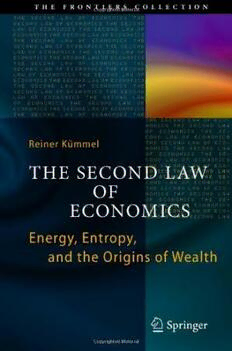
The Second Law of Economics: Energy, Entropy, and the Origins of Wealth PDF
Preview The Second Law of Economics: Energy, Entropy, and the Origins of Wealth
(cid:84) (cid:72) (cid:69) (cid:32) (cid:83) (cid:69) (cid:67) (cid:79) (cid:78) (cid:68) (cid:32) (cid:76) (cid:65) (cid:87) (cid:32) (cid:79) (cid:70) (cid:32) (cid:69) (cid:67) (cid:79) (cid:78) (cid:79) (cid:77) (cid:73) (cid:67) (cid:83) (cid:84) (cid:72) (cid:69) (cid:70) (cid:82) (cid:79) (cid:78) (cid:84) (cid:73) (cid:69) (cid:82) (cid:83) (cid:67) (cid:79) (cid:76) (cid:76) (cid:69) (cid:67) (cid:84) (cid:73) (cid:79) (cid:78) Series Editors: A.C.Elitzur L.Mersini-Houghton M.A.Schlosshauer M.P.Silverman J.A.Tuszynski R.Vaas H.D.Zeh The books in this collection are devoted to challenging and open problems at the forefront of modern science, including related philosophical debates. In contrast to typical research monographs, however, they strive to present their topics in a manner accessible also to scientifically literate non-specialists wishing to gain insight into the deeper implications and fascinatingquestionsinvolved.Takenasawhole,theseriesreflectstheneedforafundamental and interdisciplinary approach to modern science. Furthermore, it is intended to encourage activescientistsinallareastoponderoverimportantandperhaps controversialissuesbeyond theirownspeciality.Extendingfromquantumphysicsandrelativitytoentropy,consciousness andcomplexsystems–theFrontiersCollectionwillinspirereaderstopushbackthefrontiersof theirownknowledge. Forfurthervolumes: http://www.springer.com/series/5342 (cid:46)(cid:46) (cid:82)(cid:101)(cid:105)(cid:110)(cid:101)(cid:114)(cid:32)(cid:75)(cid:117)(cid:109)(cid:109)(cid:101)(cid:108) (cid:84)(cid:72)(cid:69)(cid:32)(cid:83)(cid:69)(cid:67)(cid:79)(cid:78)(cid:68)(cid:32)(cid:76)(cid:65)(cid:87)(cid:32)(cid:79)(cid:70) (cid:69)(cid:67)(cid:79)(cid:78)(cid:79)(cid:77)(cid:73)(cid:67)(cid:83) (cid:69)(cid:110)(cid:101)(cid:114)(cid:103)(cid:121)(cid:44)(cid:32)(cid:69)(cid:110)(cid:116)(cid:114)(cid:111)(cid:112)(cid:121)(cid:44)(cid:32)(cid:97)(cid:110)(cid:100)(cid:32)(cid:116)(cid:104)(cid:101)(cid:32)(cid:79)(cid:114)(cid:105)(cid:103)(cid:105)(cid:110)(cid:115)(cid:32)(cid:111)(cid:102)(cid:32)(cid:87)(cid:101)(cid:97)(cid:108)(cid:116)(cid:104) 123 ReinerKu¨mmel InstituteforTheoreticalPhysicsandAstrophysics UniversityofWu¨rzburg AmHubland 97074Wu¨rzburg Germany [email protected] SeriesEditors: AvshalomC.Elitzur Bar-IlanUniversity,UnitofInterdisciplinaryStudies,52900Ramat-Gan,Israel email:[email protected] LauraMersini-Houghton Dept.Physics,UniversityofNorthCarolina,ChapelHill,NC27599-3255,USA email:[email protected] MaximilianA.Schlosshauer NielsBohrInstitute,Blegdamsvej17,2100Copenhagen,Denmark email:[email protected] MarkP.Silverman TrinityCollege,Dept.Physics,HartfordCT06106,USA email:[email protected] JackA.Tuszynski UniversityofAlberta,Dept.Physics,EdmontonABT6G1Z2,Canada email:[email protected] Ru¨digerVaas UniversityofGiessen,CenterforPhilosophyandFoundationsofScience,35394Giessen,Germany email:[email protected] H.DieterZeh GaibergerStraße38,69151Waldhilsbach,Germany email:[email protected] ISSN1612-3018 ISBN978-1-4419-9364-9 e-ISBN978-1-4419-9365-6 DOI10.1007/978-1-4419-9365-6 SpringerNewYorkDordrechtHeidelbergLondon LibraryofCongressControlNumber:2011929864 (cid:2)c SpringerScience+BusinessMedia,LLC2011 Allrightsreserved.Thisworkmaynotbetranslatedorcopiedinwholeorinpartwithoutthewritten permission of the publisher (Springer Science+Business Media, LLC, 233 Spring Street, New York, NY 10013, USA),except forbrief excerpts inconnection with reviews orscholarly analysis. Usein connectionwithanyformofinformationstorageandretrieval,electronicadaptation,computersoftware, orbysimilarordissimilarmethodologynowknownorhereafterdevelopedisforbidden. Theuseinthispublicationoftradenames,trademarks,servicemarks,andsimilarterms,eveniftheyare notidentifiedassuch,isnottobetakenasanexpressionofopinionastowhetherornottheyaresubject toproprietaryrights. Coverdesign:KuenkelLopkaGmbH,Heidelberg Printedonacid-freepaper SpringerispartofSpringerScience+BusinessMedia(www.springer.com) Anditwas theamountofenergya single humancouldproducethatdictated militarypotential,standardofliving, happiness,andallbesides. IsaacAsimov,TheNaked Sun,1956 To Christaand Stephan, Lukas, Florian,Franziska,andJakob Foreword Physicistscontributeinvariousfieldsofsciencesforabetterunderstandingofour world. This is linked to the type of education they have to undergo. During their studies they are trained to solve problems, rather difficult and tricky problems in manycases.Theyliketodothat,otherwisetheywouldhavechosenthewrongfield for themselves. With this attitude in mind, they have made numerous significant contributionsto such differentfields as chemistry, biology, medicine, and what is of particular interest here, economics. Since physicists are used to working with equations,whichrepresenttheirideasinatransparent,logical,andconsistentframe; theywillnaturallycarryoverthatattitudetootherfieldsinwhichtheyareworking. Thisdistinguishesthemfromthosescientistswhoexpresstheirideassolelyinwords anddescriptions. The author of this volume, Reiner Ku¨mmel, is a physicist in the best sense. He received excellent training at world-renowneduniversities and despite consid- erable scientific success in a special field of physics, namely, superconductivity, he remained a generalist. What started as a hobby, namely, the study of the laws and driving forces of economics, rather soon became a serious occupation and a newbranchofinterdisciplinarywork.Hispersonalexperiences,whichhegainedin differentparts of the world, made him realize what former President Bill Clinton usedasthe1992campaigncatchphrase:“It’stheeconomy,stupid!” After his studies in Germany Reiner Ku¨mmel spent his postdoctoral years in Urbana(Illinois)asanassistantofJohnBardeen,oneofthetruegiantsofscience. In the USA he experienced the prosperity and wealth of the world’s leading economicpower.Afewyearslater,hebecameacquaintedwiththelifeandstruggle, ofthe peoplein Colombia,whereheservedforthreeyearsbuildingupa master’s programattheUniversidaddelValleinCaliinthespiritofKennedy’sPeaceCorps. ThehugedifferenceinlivingconditionsbetweentheUSAandGermany,ontheone hand,andColombia,ontheother,togetherwithhisdeterminationtodosomethingto improvethelivesofpeople,providedthebackgroundforhisincreasingengagement ineconomics.Herealizedrathersoonthatasawell-trainedphysicisthecouldmake animportantcontributiontothatfield. ix
